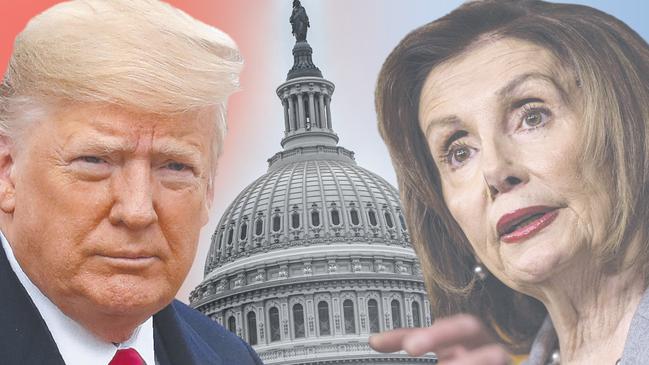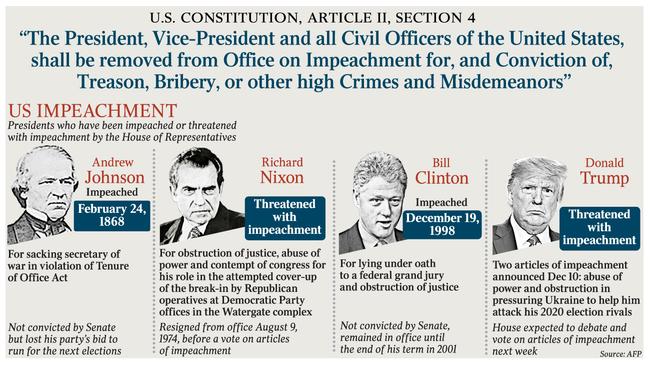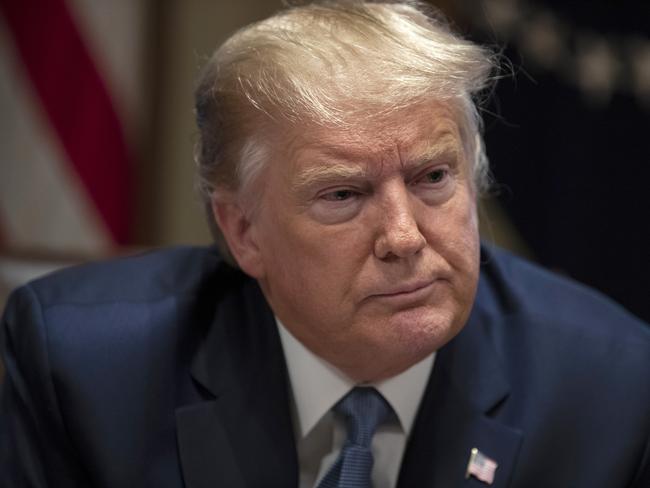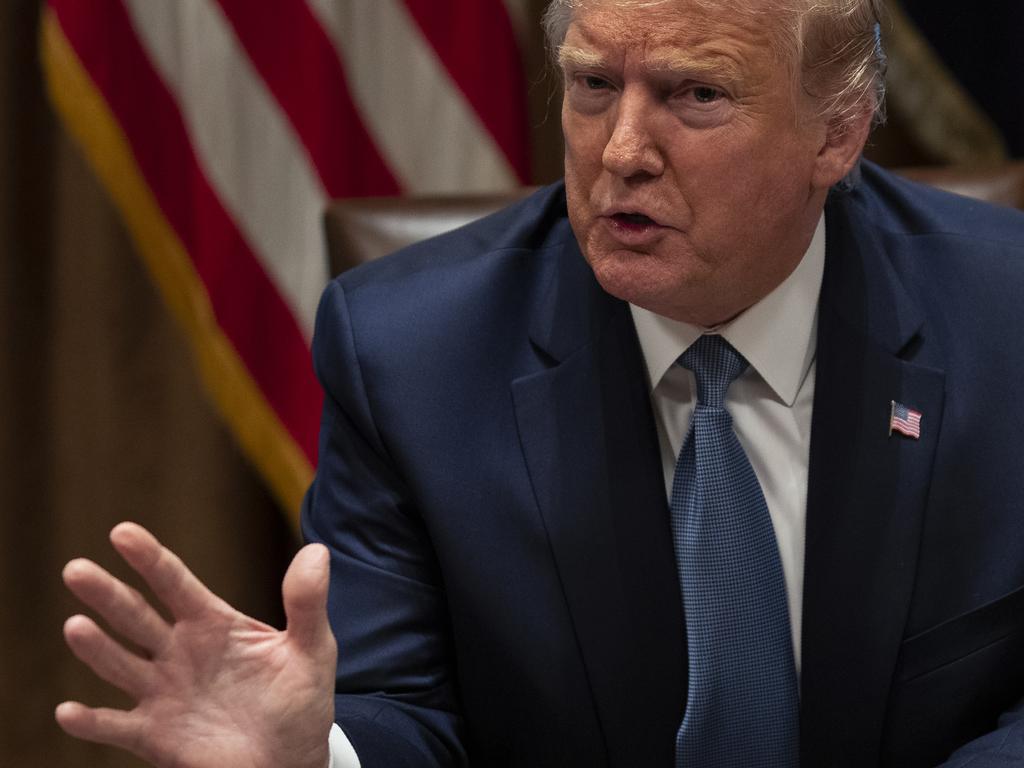Voters see Donald Trump impeachment is much ado about nothing
Voters are largely unmoved with Donald Trump set to be the third US president to be impeached.

It’s a moment that once would have held America and the world in thrall, hanging off every twist and turn in the drama. But US politics is not what it once was. Washington is cleaved along party lines and this presidential impeachment is being viewed by many Americans as not much more than another disagreement between the Democrats and the Republicans over Trump.
In Washington, life goes on as usual. Light snow has covered outdoor Christmas decorations as shoppers buy last-minute presents and hold parties where conversation are likelier to turn to holidays or football than impeachment.

There is less excitement in the nation’s capital over impeachment than there was over earlier dramas in Trump’s presidency such as the sacking of FBI chief James Comey and the appointment of special counsel Robert Mueller.
Even the Democrats seem implicitly to have accepted this. As they were signing off on articles of impeachment against Trump last week, they also were striking a consequential deal with him to pass the US-Mexico-Canada Agreement, or USMCA, the revised North American free-trade pact that replaces NAFTA.
Similarly, while Democratic Party leaders were speaking gravely about their duty under the constitution to save America’s democracy from this President, six congressional Democrats decided to join Trump as his guest at the glittering black-tie congressional ball at the White House.
Trump himself calls his predicament “impeachment lite” and on the day he is impeached — which should occur on Thursday (AEDT) — he is flying to Michigan to hold a campaign rally where he will continue to try to weaponise impeachment as a tool to galvanise his supporters.
“The Impeachment Hoax is just a continuation of the Witch Hunt which has been going on for 3 years. We will win!” he tweeted this week.
Boost for Trump
The impeachment vote in the US House of Representatives will cap an almost three-month-long saga of accusations and counterclaims about whether Trump sought to leverage US military aid to pressure Ukraine into investigating political opponent Joe Biden and his son Hunter’s activities in that country. It’s a process that has delivered white-hot political clashes between Democrats and Republicans on Capitol Hill and front-page testimony of officials in public impeachment hearings.
Despite all of this, Americans have remained largely unmoved by the spectacle. A raft of polls released during the past week have confirmed how few votes may have been changed by the impeachment saga.
Most polls show support for impeachment at somewhere between 45 per cent and 50 per cent, and opposition to it at somewhere between 43 per cent and 48 per cent — figures that are little changed from when the Democrats launched their impeachment inquiry in late September.
A NPR/PBS/NewsHour/Marist poll released this week shows 47 per cent support for impeachment and 48 per cent opposing it.
“It’s like the hearings have never happened,” says Lee Miringoff, director of the Marist Institute for Public Opinion, which conducted the poll. “The arguments have only served to reinforce existing views and everyone is rooting for their side.”
If anything, impeachment has marginally helped Trump’s personal approval rating. A Monmouth University poll shows the President’s job rating stands at 43 per cent approval and 50 per cent disapproval, slightly better than the 41 per cent to 53 per cent rating in late September when the impeachment inquiry began.
“Opinion on impeachment has been rock steady since news of the Ukraine call first broke. Any small shifts we are seeing now are likely to be statistical noise,” says Patrick Murray, director of the independent Monmouth University Polling Institute.
Polls also suggest that voters have a more nuanced and commonsense view of impeachment than the black-and-white interpretations given to them by Democrats and Republicans.
The Monmouth poll found that only 16 per cent of voters believe Trump did nothing wrong in his dealings with Ukraine. This contrasts sharply with the vast majority of congressional Republicans who publicly have backed Trump’s claims that he did nothing wrong. However, the polls also found that 30 per cent of voters say Trump’s actions may have been improper but do not rise to the level of an impeachable offence.

This is the key finding and it is the reason most Americans are not deeply engaged in the impeachment process. To many voters, Trump was wrong to pressure a country such as Ukraine to help him politically but they see it as an example of poor judgment rather than as an act that would justify overturning the results of a general election result and potentially removing a president from office.
Gamble backfires
For this reason the risk of any political fallout from Trump’s looming impeachment seems to rest more heavily with Democrats than it does with Trump and the Republicans. Democrats had been hoping that by calling an impeachment inquiry the public and at least some Republicans eventually would be persuaded that Trump’s actions in Ukraine were an impeachable offence. But the impeachment route for Democrats alway was fraught with the danger of a voter backlash, just as happened to Republicans after they impeached Bill Clinton in the house in 1998.
“Impeachment is so divisive to the country that unless there’s something so compelling and overwhelming and bipartisan, I don’t think we should go down that path because it divides the country,” Democrat house Speaker Nancy Pelosi said in March, before the Ukraine issue arose.
Now the Democrats face the uncomfortable truth that their partisan gamble on impeaching Trump in the house has failed to take the public with them. Although there is no sign so far of a voter backlash, moderate Democrats are nervous, especially those 31 house Democrats who won seats in last November’s midterm elections in areas where Trump won in 2016. A group of these Democrats met last week to discuss how they would respond to the impeachment vote and at least a handful of them are expected to vote against impeachment to try to save their seats.
Even so, the Democrats can have up to 17 defections in the house and still pass the impeachment vote, and there is no expectation that they will fail to approve the vote.
The Democrats’ liberal and moderate wings were split over which articles of impeachment to recommended against the President. Liberal Democrats argued that any abuse-of-power charge against Trump also should include obstruction of justice related to Mueller’s Russia investigation.
Some even argued to include alleged campaign finance violations by Trump relating to the payment of hush money to two women who claimed to have had affairs with him.
But the party’s moderate wing, led by Pelosi, argued that this approach would muddy the waters and make impeachment too confusing for the public. It also would have opened the Democrats to criticism that their whole impeachment push was based on a general dislike of everything Trump stood for rather than a specific alleged crime.
In the end, the Democrats settled on a minimalist approach, recommending only abuse of power in relation to Ukraine and obstruction of congress for Trump’s attempts to prevent key White House witnesses from giving testimony.
Legacy asterisk
Democrats maintain that the impeachment process was not a waste even though Trump faces almost certain acquittal in next month’s trial in the Senate, where Democrats do not have a majority, much less the two-thirds majority required to remove a president from office.
Democrat house intelligence committee chairman Adam Schiff, who led much of the impeachment proceedings, claims it is “not a failure in the sense of our constitutional duty in the house”.
“It’s a clear and present danger, I think, to our democracy, and not something that we can turn away from simply because the Republicans in the house refuse to do their duty, and are continuing to put the person of the President above their personal obligation.”
Democrats now say they believe Trump’s impeachment will encourage voters to punish him in next year’s presidential election. But if there is little palpable public anger over the Ukraine issue today, it’s hard to see how it will become a burning election issue next November when voters go to the polls.
For Trump, the impeachment saga has been a mixed bag.
“It’s very sad for the country, but it seems to be very good for me politically,” he said last week.
At a personal level, Trump is reportedly angry and wounded that he will become the third president — behind Andrew Johnson in 1868 and Clinton — to have been impeached by the house. He describes impeachment as “a dirty, filthy, disgusting word”.
Regardless of the merits or otherwise of his impeachment, Trump knows his legacy will always have an asterisk next to his name as a result of what the Democrats have done.
Republican loyalty
But so far Trump has managed the impeachment process as well as he could. He has succeeded in winning almost complete loyalty from Republicans, despite the private grievances some Republicans harbour about his policies and his style. By contrast, Clinton was never able to command such loyalty from Democrats during his impeachment.
In the house vote schedule for Thursday not a single Republican has indicated they will vote for impeachment.
The situation is similar in the Senate, where all Republicans are likely to vote against impeachment, with only moderate senators Susan Collins and Lisa Murkowski the potential defections. With the house impeachment considered a formality, attention is turning to the courtroom-style Senate trial, which will be presided over by Chief Justice John Roberts.
No ‘show trial’
Republican leaders and Trump are at odds over what sort of trial it should be. Trump appears to want a showy high-profile trial and has said he would like witnesses to included Pelosi and Schiff, as well as the intelligence whistleblower whose complaint led to the impeachment inquiry.
The President also has said he would like to see Joe and Hunter Biden appear, although it is unlikely the Republicans could compel them to give testimony.
Republican leaders, led by Senate majority leader Mitch McConnell and Trump confidant Lindsey Graham, have cautioned the President against a show trial. Their argument is that Republicans already have the numbers to acquit Trump and witnesses could backfire against them.
“I’d tell the President, if somebody is ready to acquit you, I’d sort of get out of the way,” says Graham, also chairman of the Senate judiciary committee.
Democrats say they will try to call key witnesses who did not appear in the house inquiry including acting White House chief of Mick Mulvaney and sacked national security adviser John Bolton, but Republicans almost certainly will block this.
McConnell wants to limit the trial process, which is likely to start around January 6, to only several weeks, meaning Trump is likely to be impeached and acquitted by the end of the month.
From that point it seems likely an impeachment that never really gripped the public’s imagination will fade from view. In early February, the Democratic fight for the presidential nomination officially will begin with the first caucus in Iowa. At the same time Trump will ramp up his own campaign re-election machine. Issues such as jobs, the economy, healthcare and immigration will grab the spotlight ahead of Ukraine. By the time Americans cast their votes in November, this impeachment, however historic, may already be a footnote in history.
Cameron Stewart is also US contributor for Sky News Australia.








Sometime in the next 24 hours, Donald Trump will become only the third US president to be impeached.